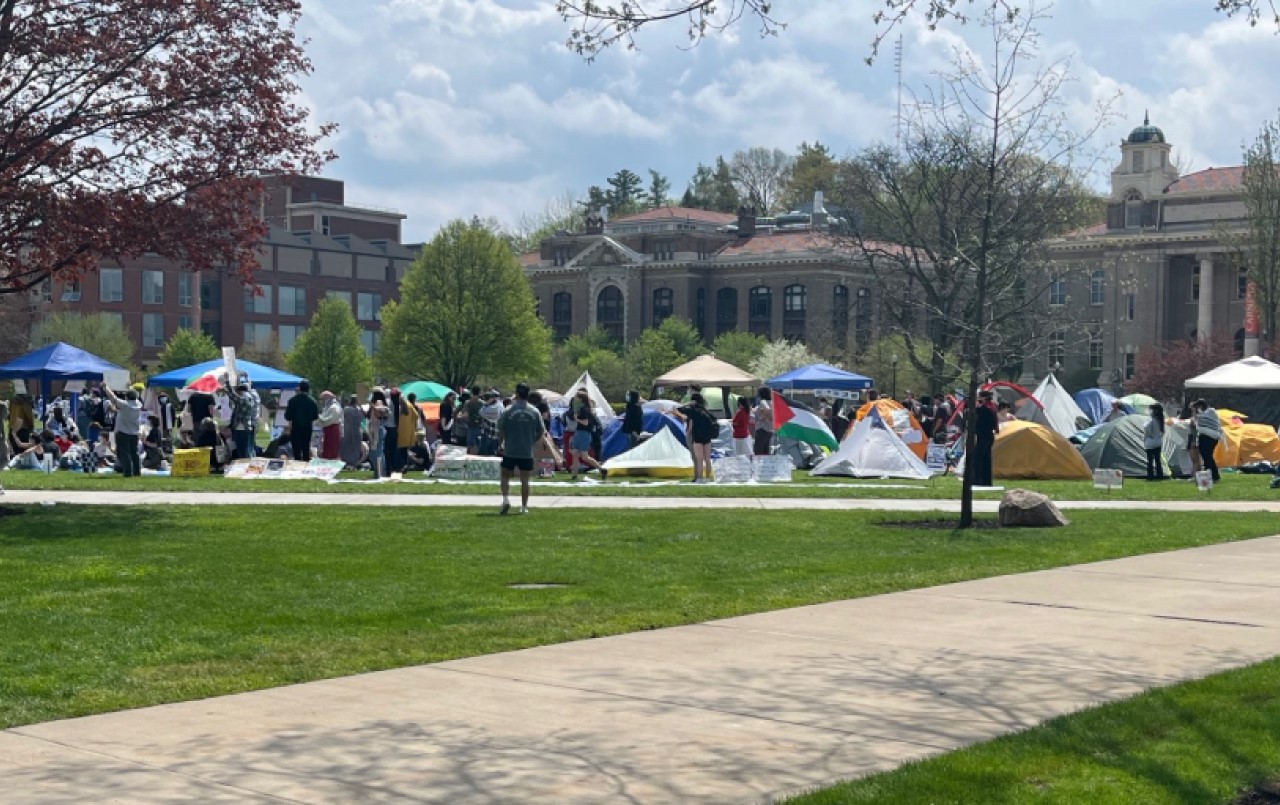Israel/Hamas War and Calls for a Ceasefire (#1)
In his community message on October 9, 2023, Chancellor Syverud expressed his “horror” at the “violence in both Israel and Gaza” occurring as a result of the Hamas attack on Israel two days previously. He expressed specific support for our community members who “may hail from Israel and Gaza, have family directly impacted by these horrific events, or fear for the safety of their loved ones and homelands.” On October 16, 2023, the Chancellor again wrote to the campus community, expressing concern for both the “horrific terror attacks” by Hamas “targeting innocent civilians” and “a developing humanitarian crisis in Gaza where innocent civilians are facing death and displacement, and dire conditions are growing worse.” He urged our community to “reject antisemitism” and “reject Islamophobia.” These two statements by the Chancellor in early and mid- October offered a clear concern for both Israeli and Palestinian civilian lives lost in or impacted by the violence.
As with the war in Ukraine, where the Chancellor issued a statement on February 25, 2022, acknowledging with concern the “horrific images” being reported from early reports on the Russian invasion of Ukraine, the Chancellor’s statements on world events are delivered at the very early stages to acknowledge the impact on members of our community and the supports available at the University.
The Syracuse University Student Association passed a resolution on December 4, 2023, calling for a “permanent peace process” for the conflict. This is the representative body for undergraduate students at the University. It does not appear the Graduate Student Organization has taken a position on a ceasefire or peace process, but they are another representative body you might consider petitioning.
University Endowment Investments (#2)
The University’s endowment is funded by sources other than student tuition dollars, primarily private gifts and endowment investment returns. Tuition revenue alone is insufficient to cover the University’s operating expenses, and the endowment helps fill the remaining gap.
The University’s endowment investment decisions are made by an outsourced investment office. That entity follows a strategy that invests in diversified funds that own interests in a broad group of publicly traded companies, as well as in limited partnership funds that own interests in privately held companies. A very small part of the endowment is invested in individual privately held companies, where the University is simply one co-investor with others in an investment pool.
With respect to Syracuse University’s endowment investments, there is a specific process that addresses how a member of the community may raise a concern. The Statement of Investment Objectives and Policies provides in relevant part:
“…[I]f there are instances of activity which are attributed to an external party in which the University invests, and allegations are made by members of the University community that these activities cause substantial social injury to an external party’s employees, consumers, or others, the University will conduct a review of the allegations. The review will determine what actions, if any, the University should take in response to the concerns.”
To request a review, you must write to the Chancellor and to the Senior Vice President and Chief Financial Officer (CFO) explaining with specificity what you are seeking relative to our investments, including divestment from specific industries, and why this should occur consistent with the standard set forth in the policy. The CFO will conduct a review, consulting with others as necessary. The CFO does not consider anonymous requests. After the CFO completes his review, the CFO and Chancellor will determine if the stated concern should be referred to the Investment and Endowment Committee (IEC) of the Board of Trustees, offering their recommendation to the IEC.
Student Freedom of Expression (#4)
Strong support for freedom of expression by students exists under the University’s current policies. The Rights and Responsibilities of students at Syracuse University specifically includes freedom of expression. That freedom is not unlimited, just as with the First Amendment’s protections applicable to state institutions. Specifically, our Rights and Responsibilities for students states:
“Students have the right to express themselves freely on any subject provided they do so in a manner that does not violate the Code of Student Conduct. Students, in turn, have the responsibility to respect the rights of all members of the University to exercise these freedoms.”
It further provides:
“Students have the right to assemble in an orderly manner and engage in peaceful protest, demonstration, and picketing, which does not disrupt the functions of the University, threaten the health or safety of any person, or violate the Code of Student Conduct.”
The University’s Campus Disruption Policy provides, in pertinent part:
“Syracuse University is committed to the principle that freedom of discussion is essential to the search for truth and, consequently, welcomes and encourages the expression of dissent. Freedom of expression, however, ceases at the point when its exercise infringes on the rights of either participants or nonparticipants.”
The Campus Disruption Policy details with specificity the types of conduct that fall outside the scope of protected expression for violations of the policy.
On Wednesday morning, May 8, University staff explained, verbally and in writing, that anyone participating in the protest activity on the Quad who refused to relocate to one of the two alternative sites offered would, for all actions in violation of University policy from that point forward, be referred to the Student Conduct Process for violation of the Student Conduct Code. Continued presence in that space denied its use by the University for Commencement activities, including preventing erection of a large tent for use by schools, graduating students, and their families. Students who remained in the Quad protest space after 11:00 am on May 8, or who thereafter joined the protest in that space, made a conscious decision to accept the consequences of that decision, which includes referral to the Student Conduct Process.
If a student is found responsible for a violation of the Student Conduct Code, an appropriate sanction will be imposed. A student who completes all assigned sanctions by the assigned date and has no new infractions may later petition for expungement of the record of a conduct violation pursuant to Section 13.5 of the Student Conduct System Handbook, if (1) the conditions for expungement set forth in the Handbook are met, and (2) the Director of Community Standards approves the expungement request.
Academic Freedom (#5)
Robust protections for academic freedom by faculty at the University are set forth in University policy. Section 3.5 of the Syracuse University Faculty Manual covers the subject of Faculty Rights. This includes “Academic Freedom” (Section 3.51 and Appendix) and “Political Activities of Faculty Members” (Section 3.52). Section 4.11 covers the “Complaint Procedure for Allegations of Inappropriate Conduct” by a faculty member and Section 4.6 describes the significant due process rights of all faculty who may be the subject of an allegation of misconduct, including an alleged violation of policies for conduct not covered by academic freedom (for example, specific conduct that violates the University’s Anti-Harassment Policy). Equal Opportunity, Inclusion, and Resolution Services (EOIRS), Academic Affairs, and Academic Freedom, Tenure, and Professional Ethics (AFTPE) are all involved in that process.
In addition, the Syracuse Statement on Free Expression and Free Inquiry, recently drafted by a working group of faculty, students, staff, and alumni, contains a detailed paragraph strongly reinforcing the University’s commitment to academic freedom. It will be released to the community later this year.
Summary
As explained above, the University has in place systems, processes, and policies that address most, if not all, of the issues you raise in your list of concerns. You are entitled to access and utilize these systems, as is any student with concerns, and make your arguments there. Our staff are happy to respond to any process questions you may have as you do so.
Student Experience Division
May 14, 2024











